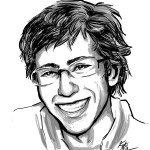To whom it may concern,
I hope this column finds you well. My name is Harry Graver, and as an undergraduate at Yale University I am writing to apply … Oh wait. Sorry.
Certain habits are tough to shake. Over the last few weeks, I, like many students across Yale, have begun countless emails and letters in a very similar fashion. During the months of December and January, drafting a cover letter becomes a daily ritual akin to brushing one’s teeth, showering, eating — or, as some websites tell us, actually far more important than any of those three.
[media-credit id=12227 align=”alignleft” width=”150″] [/media-credit]
[/media-credit]
Perhaps, though, the most meaningful aspect of the whole process is not the answer about your candidacy. It is the examination you are forced to do beforehand.
We are asked to put down our identity on an 8.5 x 11 piece of paper. On one hand, it’s quite jarring. On the other hand, it’s quite revealing. As we are forced to quantify ourselves, we employ a set of value judgments which can only be made from the outside, looking in. What am I proud of? What have I done? How in God’s name am I already twenty? (Maybe not as much the last.)
A lot of good, though, comes from this longstanding ordeal. It is not some arbitrary construct, passed down from generation to generation as a sort of intellectual hazing. There is a method to the madness, even if it is tough to see anymore after a third reading of Case in Point.
Everyone has heard the advice to, “know your resume’s story,” before going into an interview. But, the genuine value of this suggestion is not as much revealed when a question is answered at an interview, as it is in the hours worth of questions we pose to ourselves in the nights prior.
That is not to suggest that our quest is all cheer and roses, without serious dangers. As we attempt to describe ourselves, the impulse arises to redefine. As we put ourselves before the prospect of failure, there is a defensive inclination to protect oneself by, in a way, creating a distance from oneself. In doing so, we can forget to shift gears at times, failing to return from the application to the applicant, and are thus left looking to the sum of our experiences, our passions in practice, as sterile, analytical means to an end.
And these pitfalls seem particularly audacious at Yale, where our extracurricular groups are so fundamentally a part of both our college experience and personal character. It does not take long at the Extracurricular Bazaar, or after a few conversations with friends from other schools, to realize just how unique Yale’s emphasis on developing the mind outside the classroom fosters its students’ hopes and expectations of each other.
This remarkable dynamic, though, can also lay the groundwork for a prevalent trap. We look too often upon our resumes as a zero sum game — a tradeoff wherein we pay for each line of paper, each leadership title, with those memories’ sincerity.
In the end, these wounds are self-inflicted, and understandable, given this overwhelming process. In fact, this is where its very virtue lies. As we craft our candidacies amongst our peers, we are afforded a reorientation to our surroundings — one without the fashioned persona we flirted with before. And naturally, as we come back to ourselves, the road is as littered with humility and fear as it is with esteem and fulfillment.
What appears as a stack of resumes is really a profoundly shared endeavor. It is indeed exhausting at times to be one of the many in there — but it is also a tremendous blessing. If the process is done right, the pile can stare back at us like a mirror, as we gain glimpses of ourselves through those around us, be it dear friends or distant strangers.
How this will all shake out is out of our hands. How we make and are shaped by this journey is entirely up to us.
Harry Graver is a junior in Davenport College. Contact him at harry.graver@yale.edu .







